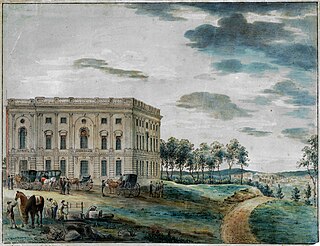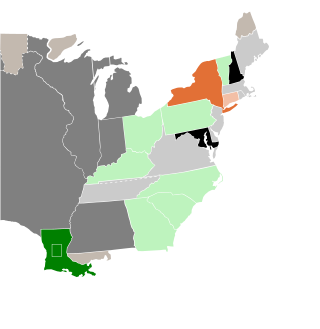Related Research Articles

The 12th United States Congress was a meeting of the legislative branch of the United States federal government, consisting of the United States Senate and the United States House of Representatives. It met in Washington, D.C. from March 4, 1811, to March 4, 1813, during the third and fourth years of James Madison's presidency. The apportionment of seats in the House of Representatives was based on the 1800 United States census. Both chambers had a Democratic-Republican majority.

The 13th United States Congress was a meeting of the legislative branch of the United States federal government, consisting of the United States Senate and the United States House of Representatives. It met in Washington, D.C. from March 4, 1813, to March 4, 1815, during the fifth and sixth years of James Madison's presidency. The apportionment of seats in the House of Representatives was based on the 1810 United States census. Both chambers had a Democratic-Republican majority. The first two sessions were held at the Capitol building while the third, convened after the Burning of Washington, took place in the First Patent Building.
The 1816–17 United States House of Representatives elections were held on various dates in various states between April 30, 1816 and August 14, 1817. Each state set its own date for its elections to the House of Representatives before the first session of the 15th United States Congress convened on December 1, 1817. The size of the House increased to 184 after Indiana and Mississippi achieved statehood.
The 1814–15 United States House of Representatives elections were held on various dates in various states between April 26, 1814, and August 10, 1815. Each state set its own date for its elections to the House of Representatives before the first session of the 14th United States Congress convened on December 4, 1815. They occurred during President James Madison's second term. Elections were held for all 182 seats, representing 18 states.

The 1812–13 United States House of Representatives elections were held on various dates in various states between August 3, 1812, and April 30, 1813. Each state set its own date for its elections to the House of Representatives before the first session of the 13th United States Congress convened on May 24, 1813. They coincided with James Madison being re-elected president.

The 1810–11 United States House of Representatives elections were held on various dates in various states between April 24, 1810, and August 2, 1811. Each state set its own date for its elections to the House of Representatives before the first session of the 12th United States Congress convened on November 4, 1811. They occurred during President James Madison's first term. Elections were held for all 142 seats, representing 17 states.

The 1808–09 United States House of Representatives elections were held on various dates in various states between April 26, 1808, and May 5, 1809. Each state set its own date for its elections to the House of Representatives before the first session of the 11th United States Congress convened on May 22, 1809. They coincided with James Madison being elected as president. Elections were held for all 142 seats, representing 17 states.

The 1806–07 United States House of Representatives elections were held on various dates in various states between April 29, 1806 and August 4, 1807. Each state set its own date for its elections to the House of Representatives before the first session of the 10th United States Congress convened on October 26, 1807. They occurred during Thomas Jefferson's second term. Elections were held for all 142 seats, representing 17 states.

The 1812–13 United States Senate elections were held on various dates in various states, coinciding with President James Madison's re-election. As these U.S. Senate elections were prior to the ratification of the Seventeenth Amendment in 1913, senators were chosen by state legislatures. Senators were elected over a wide range of time throughout 1812 and 1813, and a seat may have been filled months late or remained vacant due to legislative deadlock. In these elections, terms were up for the senators in Class 3.

The 1794–95 United States Senate elections were held on various dates in various states. As these U.S. Senate elections were prior to the ratification of the Seventeenth Amendment in 1913, senators were chosen by state legislatures. Senators were elected over a wide range of time throughout 1794 and 1795, and a seat may have been filled months late or remained vacant due to legislative deadlock. In these elections, terms were up for the senators in Class 3.

The 1810 United States House of Representatives elections in New York were held from April 24 to 26, 1810, to elect 17 U.S. Representatives to represent the State of New York in the United States House of Representatives of the 12th United States Congress. At the same time, a vacancy was filled in the 11th United States Congress.

The 1812 United States House of Representatives elections in New York were held from December 15 to 17, 1812, to elect 27 U.S. Representatives to represent the State of New York in the United States House of Representatives of the 13th United States Congress. At the same time, a vacancy was filled in the 12th United States Congress.

The 1814 United States House of Representatives elections in New York were held from April 26 to 28, 1814, to elect 27 U.S. Representatives to represent the State of New York in the United States House of Representatives of the 14th United States Congress.

Louisiana held its first United States House of Representatives elections following its April 1812 admission to the Union on September 28–30, 1812. A special election for a seat in the 12th Congress and a general election for a seat in the 13th Congress were held at the same time, and had nearly-identical results.

The 1824 United States elections elected the members of the 19th United States Congress. It marked the end of the Era of Good Feelings and the First Party System. The divided outcome in the 1824 presidential contest reflected the renewed partisanship and emerging regional interests that defined a fundamentally changed political landscape. The bitterness that followed the election ensured political divisions would be long-lasting and facilitated the gradual emergence of what would eventually become the Second Party System. Members of the Democratic-Republican Party continued to maintain a dominant role in federal politics, but the party became factionalized between supporters of Andrew Jackson and supporters of John Quincy Adams. The Federalist Party ceased to function as a national party, having fallen into irrelevance following a relatively strong performance in 1812.

The 1816 United States elections elected the members of the 15th United States Congress. Mississippi and Illinois were admitted as states during the 15th Congress. The election took place during the First Party System. The Democratic-Republican Party controlled the presidency and both houses of Congress, while the Federalist Party provided only limited opposition. The election marked the start of the Era of Good Feelings, as the Federalist Party became nearly irrelevant in national politics after the War of 1812 and the Hartford Convention.

The 1812 United States elections elected the members of the 13th United States Congress. The election took place during the First Party System, and shortly after the start of the War of 1812. The Federalist Party made a relatively strong showing, winning seats in both chambers while supporting a competitive challenge to the incumbent Democratic-Republican president. However, the Democratic-Republican Party continued its control of the presidency and both houses of Congress.
References
- 1 2 "12th Congress March 4, 1811, to March 3, 1813". Office of the Historian, United States House of Representatives. Archived from the original on September 22, 2018. Retrieved October 5, 2018.
- ↑ Election details from Ourcampaigns.com